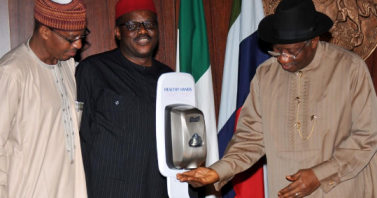As at the 18th of August 2014, there are 11 confirmed Ebola cases in Nigeria and 4 deaths. About 190 contacts of cases are still under surveillance. A new isolation ward with a 40-bed capacity is now functional at the Mainland Hospital, Yaba. Things are not looking too bad. It is too early to reflect on lessons learnt, but some things have stood out for us. As a country, we must reflect on these to prepare us for the future. We must turn this crisis into an opportunity to answer some hard questions about our society and our health sector. Below are our 5 inconvenient truths that the Ebola outbreak has revealed.
The use of Personal Protective Equipment (PPE) is a rarity in Nigerian hospitals, public and private. The best information that we have at the moment is that 8 of the 11 infected people in Nigeria are health care professionals. We pray for those still battling for their lives. The truth though is that other than the often dirty white coats that we wear around our hospitals, there is little else that protects health care workers and our patients against infectious diseases. Masks, boots, goggles … the closest many of us have come to seeing them used in health care settings is in Grey’s Anatomy. In most public hospitals in Nigeria, patients are often requested to buy gloves for their own examination. Right now, as we scramble to respond to the outbreak, there are several procurement contracts being signed for PPE from all over the world. We hope that, as we get this Ebola outbreak under control (which we will), these tools will not end up in shelves and drawers. We need a complete paradigm shift on our attitude to PPE.
We prefer sanitizers because very few public hospitals have running water. It is no surprise that the president chose sanitizers over water and soap to demonstrate basic hygienic precautions to take regarding Ebola. Barely any public hospital in Nigeria has running water, talkless of soap. The preference for sanitizers is therefore not surprising. They quickly sold out in most Nigerian cities after the president’s photo-op. Alcohol-based hand sanitizers can be used in addition to hand washing, but should not substitute for washing with soap and water. While alcohol-based hand sanitizers (particularly those with 60 percent alcohol or more) can reduce the number of some germs, a study from the Centers for Disease Control and Prevention reveals that hand sanitizers don’t reduce the spread of viruses. Secondly, they do not work when used on dirty hands, and finally, at N1000 per half litter bottle, they are out of reach for 95% of Nigerians. The overwhelming evidence shows that hand sanitizers may have some benefits; but soap and water is much better. The proper hand washing technique is described here. Or even better – listen to a podcast in Pidgin English: REASON AM! PODCAST 11.
We are an extremely vulnerable people. Once there is a crisis, we clutch at straws, filling up places of worship waiting for miracles. No matter how often colleagues have tried to explain that Ebola is not airborne, the “arguments” come back right at you. When we received calls and messages regarding salt and water, we initially thought that it must be a joke, until we realized how seriously people took this. Newspapers reported on at least two deaths. More stories emerged of the value of “holy water”, and the famous Nigerian pastor TB Joshua is reported to have sent 4,000 bottles of his own patented holy anointed water to Sierra Leone. Another popular remedy is Professor Iwu’s “bitter kola”. But nothing could have prepared us more than a pronouncement by the Honorable Minister of Health that Nigeria was expecting the arrival of a substance called “Nano Silver”. It took the intervention of the US FDA to bring to the attention of Nigerians that this substance was a pesticide. This was really unnecessary as a cursory search of the internet would have revealed as much. Thankfully the Honorable Minister has withdrawn his endorsement and passed the responsibility on decisions on drugs to a Professor Maurice Iwu led committee! The truth is that science does not work that way. But as long as our universities remain the way they are, we will continue reaching out for miracles.
We have never paid sufficient attention to infectious diseases. There are 3.5 million Nigerians living with HIV and about 200,000 deaths from AIDS in 2013. About 500,000 HIV patients are on antiretrovirals, all funded by donor funds. An estimated 270,000 Nigerians are infected by tuberculosis annually causing about 30,000 deaths! Cholera (yes, cholera) outbreaks occur all over Nigeria annually; this July, six Nigerians died from cholera in Kano. It barely received any media attention. A measles outbreak in Nigeria last year lasted 28 weeks, during which time 36,428 cases of measles were reported and 198 people died. We have almost normalized the occurrence of Lassa fever. People don’t learn how to manage outbreaks during Ebola outbreaks. This happens during the management of small outbreaks of gastroenteritis et al. One excellent cadre of colleagues currently supporting the Ebola outbreak is the Nigerian Field and Laboratory Training Programme initiated by the US CDC in Nigeria and now managed by the Nigerian Centre for Disease Control. We hope that some of the “Ebola money” will go into building sustainable infrastructure and human resources to respond to some of the huge infectious disease challenges in Nigeria.
We all prayed that British Airways would continue flying to Nigeria. The absolute worst case scenario for Nigeria would have been for British Airways to cancel flights to Nigeria; what would we do? … think about it!
Finally, our respect goes out to the brave colleagues on the frontlines, the drivers, the volunteers … and especially to the brilliant colleagues at ebolaalert.org and ebolafacts.com, who have not stopped since Day 1. We love the podcasts at http://reasonam.com/2014/07/07/ebola-virus-reason-am-podcast-10.



